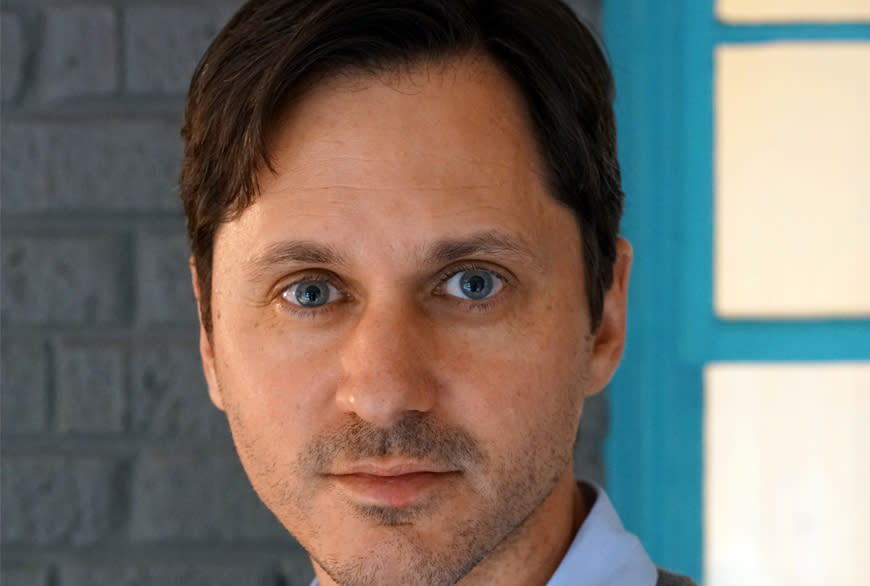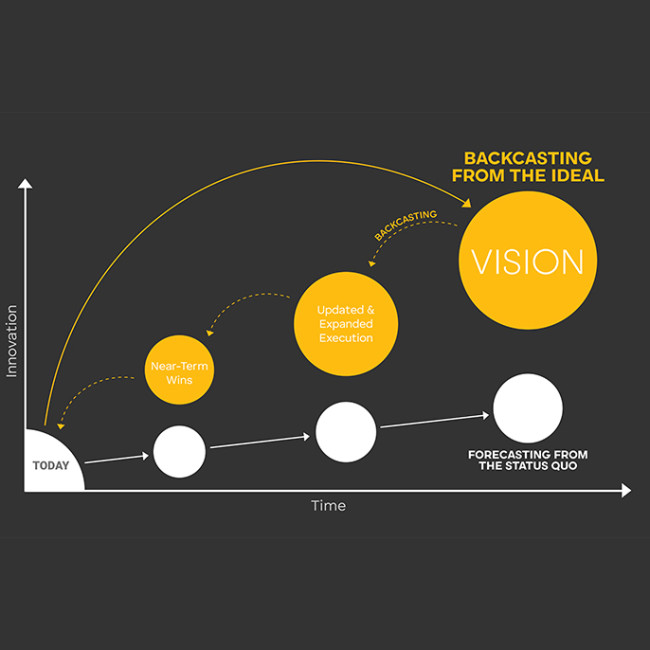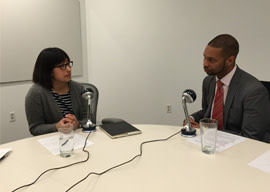
What do you do when you learn that a self-driving car is about start tooling around your neighborhood? Well, when we read that nuTonomy, the Cambridge-based autonomous-vehicle company, was doing so in the Raymond L. Flynn Marine Park—Continuum’s home turf—we had to get in touch. We had, of course, questions, and the company’s CEO, Karl Iagnemma, was generous enough to provide answers. Scroll down, and get to know Iagnemma and his project.
Continuum: The Boston Globe reports that your self-driving car is having some issues with the seagulls that flock around the Seaport. Fascinating to see how the press presents a challenge to the design process—which is natural and expected—to be a feverish bit of drama. What do you think of the way the seagull story is presented? How do you folks at nuTonomy tell yourselves this story?
Karl Iagnemma: The fact that something as harmless and mundane as a flock of seagulls can cause a sophisticated self-driving car to hesitate is curious, surprising, and maybe a little comforting. I’m not surprised that the local media found it interesting enough to report. We got a kick out of it at the office.
Continuum: You are a fiction writer! One with a Paris Review discovery prize! One whose work is in the Best American Short Stories and The Pushcart Prize! Are your investors aware of this? Seriously, though: Do you find your ability to imagine a vivid scene, a vivid story help you as an innovator? At Continuum, we often work with clients to imagine a future state and work to figure out a means of getting there. I wonder your fiction writer’s imagination has been helpful (in inspiring nuTonomy employees, in laying out a compelling story for VCs, etc.)?
The most interesting aspect of my work as CEO is figuring out how to shape nuTonomy’s activities into a narrative.
KI: Narrative is powerful. It’s the engine of fiction, of course, but also of non-fiction, presentations of all stripes, legal arguments, sermons, dirty jokes … you name it. We are comforted by the presence of a coherent narrative, since it helps us make sense of events that might otherwise leave us confused or uncertain. It’s important to me that nuTonomy’s narrative is coherent—so that our employees understand why we’re doing what we’re doing, so that investors believe in our vision, and so that members of the media are aware of our effort. The most interesting aspect of my work as CEO is figuring out how to shape nuTonomy’s activities into a narrative.

Continuum: Another local person with an interest in self-driving cars, Zipcar co-founder Robin Chase, who wrote in an essay called “Self-Driving Cars Will Improve Our Cities. If They Don’t Ruin Them”: “[C]ities and countries must actively shape the introduction of AVs[autonomous vehicles]. We are getting access to this technical marvel at the precise moment when cities are full and bursting from the urbanizing of our planet, when we absolutely need to transition rapidly from fossil fuels, and when it is imperative to improve people’s access to opportunity: jobs, education, health services. We have the ability to eliminate congestion, transform the livability of cities, make it possible to travel quickly and safely from A to B for the price of a bus ticket, improve the quality of our air, and make a significant dent in reducing CO2 emissions.” How do you respond to Chase’s vision? Are you interested in, say, helping design civic policy in Boston? And if so, how?
KI: I am interested in developing the technology that will save millions of lives worldwide, and improve the efficiency of global transportation. I founded nuTonomy with Emilio Frazzoli because we understood that autonomous vehicle technology could have a positive global impact if deployed in a thoughtful way. We are certainly interested in shaping the deployment of the technology however we can. We are happy to have a voice at the table in both Singapore and Boston when AV technology is discussed.
Continnum: You’ve been test-driving your car around Raymond L. Flynn Marine Park, right where I’m typing these words. Why? Was this your idea? The City of Boston’s? Did it spring from New Urban Mechanics? What are the positive and negative elements of testing in this neck of the woods? I must admit, I’ve not yet seen one of your cars on the road—and I’m here five days a week.
KI: nuTonomy was founded in Cambridge, so testing our technology locally is a natural step for the company. When we approached the City of Boston about driving autonomously on public roads, we were pleased that they were receptive to the idea. We were also excited by the prospect of testing in a region that is very different from Singapore (where we also test). Singapore is warm and wet, with immaculate roads and drivers that are cautious and law-abiding. Boston provides us with a test environment that is colder and more complex. We’ve driven only a few hundred miles in Boston, but will be scaling up our fleet in the coming months. Keep an eye out for our snazzy teal logo.
Continuum: What was your reaction to the first autonomous car fatality back in June 2016? What did your company learn from this? Did you make any specific changes in reaction to it? How well do you think Tesla handled it?
KI: Tesla’s autopilot is not a fully autonomous system, since it requires the driver to remain vigilant at all times, and be prepared to take control of the vehicle if need be. In the case of the fatal accident, the driver was unable to take control in time to prevent the accident.
nuTonomy’s approach is fundamentally different from Tesla’s, since we do not believe that drivers should be expected to remain attentive enough to seize control from a fast-moving vehicle at a moment’s notice. Tesla’s accident only reinforced our belief that fully autonomous driving is the right path to follow.
There are so many sources of anxiety in a startup! More than I can list on this small screen.
Continuum: You have written, in an author’s note, that “the anxiety and yearning of research continually repeats itself.” Would you please pinpoint for us the location of anxiety and research in your work with nuTonomy?
KI: There are so many sources of anxiety in a startup! More than I can list on this small screen.
Continuum: Ten years from now, when we talk about you and your work, what will we be talking about?
KI: My hope is that we’ll be discussing a recently released book about one of today’s essential American stories: the startup story. The startup is the newest incarnation of the American dream, and the reality is at least as interesting as the mythology. I’m looking forward to writing that book.
Continuum: Finally, your last name, Iagnemma, is the coolest last name I’ve run across in a very long time. As we’re conducting this interview via Google Doc, I’m unable to hear you pronounce it. Please tell us the proper way, and give us any etymological information that you possess about it.
KI: It’s a tricky one—if the “ia” doesn’t trip you up, the “gn” usually does. The sound you’re looking for is a “y” sound in both instances: “yon yemma.” My father immigrated to the U.S. from Italy, and apparently the name is unusual even in Abruzzo.




